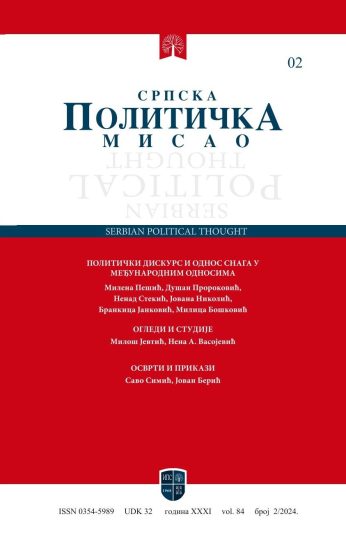LAW AND POLITICS
AMENDING DRAFT LAWS ‒ USE OR ABUSE?
Abstract
An amendment is a proposal for modifying and adding new parts to a draft law. It represents a part of a wider corpus, the right to legislative initiative, but it always refers to the text of the bill that is on the agenda of a parliament or is in the parliamentary procedure. The aim of this paper is to present the original goal of the amendment, as well as the modification of the purpose of the tabling of this procedural instrument of parliamentary law. An amendment had been traditionally seen as an instrument of influencing the content of the laws passed by the parliament. Given that today, in the era of absolute domination of the government in countries with the parliamentary system of state power, it has become a key player in all stages of the legislative process and the monopolist in proposing the law, the deputies on legislative policy cannot effectively influence the submitting of
draft laws in any other way, but by submitting amendments. For the functioning of today’s parliament, however, it is not enough to take into account the dominant position of the government, but we must also bear in mind the key role of political parties and the rules stemming from party discipline.
Amendments by opposition MPs (members of parliaments) – in addition to attempting to realize their original purpose – are submitted so that they would speak of government failures, a problem that must be solved, an initiative that should be achieved. Opposition MPs use their right to speak, which is the basis for the performance of all parliamentary functions, and above all of a representative role. Anything that deputies suggest or say, they do so as representatives of the citizens as bearers of sovereignty who, by exercising sovereignty, elect their representatives. Earlier in the science of constitutional law, the question was raised whether the amendments of the opposition MPs – although they represent the means of political struggle in the parliament – are always good-natured or can be regarded as a form of abuse of rights. Obstruction is to some extent always a sine qua non of parliamentary life, given the fact that parliaments are political bodies. On the other hand, the members of the ruling majority are increasingly using the right to file amendments. The aim of these procedural means of legislative procedure, however, is not primarily the intention to amend the draft law, but to discuss and praise the policy of the government and its results and to narrow the opposition’s maneuvering space in criticizing it. In this way, the original meaning of the amendment is modified and they become the means of fighting “for the stage”, during the parliamentary debate on the bill. In this paper, we present and analyze the new practice from the last six months in the work of the National Assembly of the Republic of Serbia, which shows that it can no longer be argued that the amendments are submitted primarily by the opposition and independent deputies, as it was previously considered in the science.
The new practice in the functioning of the ruling majority in our parliament is considered to be an inventive, legitimate means of political struggle that takes place in a legal manner in accordance with the valid Rules of Procedure, which is the product of another ruling majority, although one of the greatest Serbian lawyers of the twentieth century, Slobodan Jovanović had considered it as obstruction, that is, “the form of abuse of rights” and “unlawful occurrence”.
References

